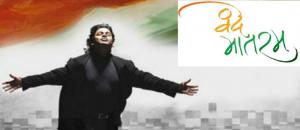The Partition divided India. Jinnah went away as soon as he made Pakistan. But the poison remained in Free India. The unassailable symbols of our freedom struggle came under its assault. One of these is National Song Vande Mataram. So much so that this song of national pride is constantly hauled and humiliated through legal options in our times.
So we see a fair number of Maulvis and Maulanas, claiming to represent Muslim community, protesting against the singing of Vande Mataram which they believe is against the tenets of Islam. According to them, only the Allah is revered by followers of Islam and a prayer for a mother or father, or for that matter a nation, is not permitted.
If that is so, how come Vande Mataram wasn’t an issue when it was sung in one voice by all freedom-fighters, be it Hindus or Muslims, as the nationalist forces fought tooth and nail the British imperialism as the 20th century dawned. (The song had been in prevalence and an igniting force for a good 35 years by then).
Do such “saviours” of Islam need be reminded how Hindus and Muslims chanted Vande Mataram interminably while they fought against the division of Bengal in 1906? Does it bear a repetition that every freedom fighter who laid down his life for India’s liberation in those heroic years died with Vande Mataram on his lips?
All assemblies and sessions of Congress began with the recitation of Vande Mataram. Till the Muslim League came into the picture. Mohammad Ali Jouhar duly in the 1923 Congress session opposed the singing of Vande Mataram and stepped down from the platform. Interestingly, Maulana Abul Kalam Azad was then the serving Congress president.
By 1938, another Muhammad Ali, Jinnah, had gone public in his distaste for Vande Mataram and along with him a legion of his supporters too became vocal in opposition to it.
So we have a situation where the ultimate sacrifices of martyrs, such as Abdul Hameed and Ashfaq Khan who gave away their lives with Vande Mataram on their lips, is being trashed by those who claim to represent a particular theology. Show me an Indian who wouldn’t have tears in his eyes while listening to A.R. Rahman singing Vande Matram live? Must such free flowing emotions be leashed only because a few are intent on causing a religious divide?
So if the Muslim populace of Sri Lanka or Indonesia recite the national song in reverence does it make them any less Muslim?
The very first meeting of the constituent assembly on August 14, 1947 began with Vande Mataram. It was done so as it represented the ethos of national pride and honoured memory of India’s valiant sons. Is it fair to cast a symbol of patriotism on the scales of religion? If France asks Muslim women to not wear a veils in public, is it termed a case of religious prejudice? Does it bring a nation to a halt?
Are we then to believe that those who want the entire humanity to come under the sway of Islam would never accept any allegiance to a nation which gives them job, security and equality? Does the very air and smell of the land in which they live has to be negated and made subservient to a cause propagated by a few?


